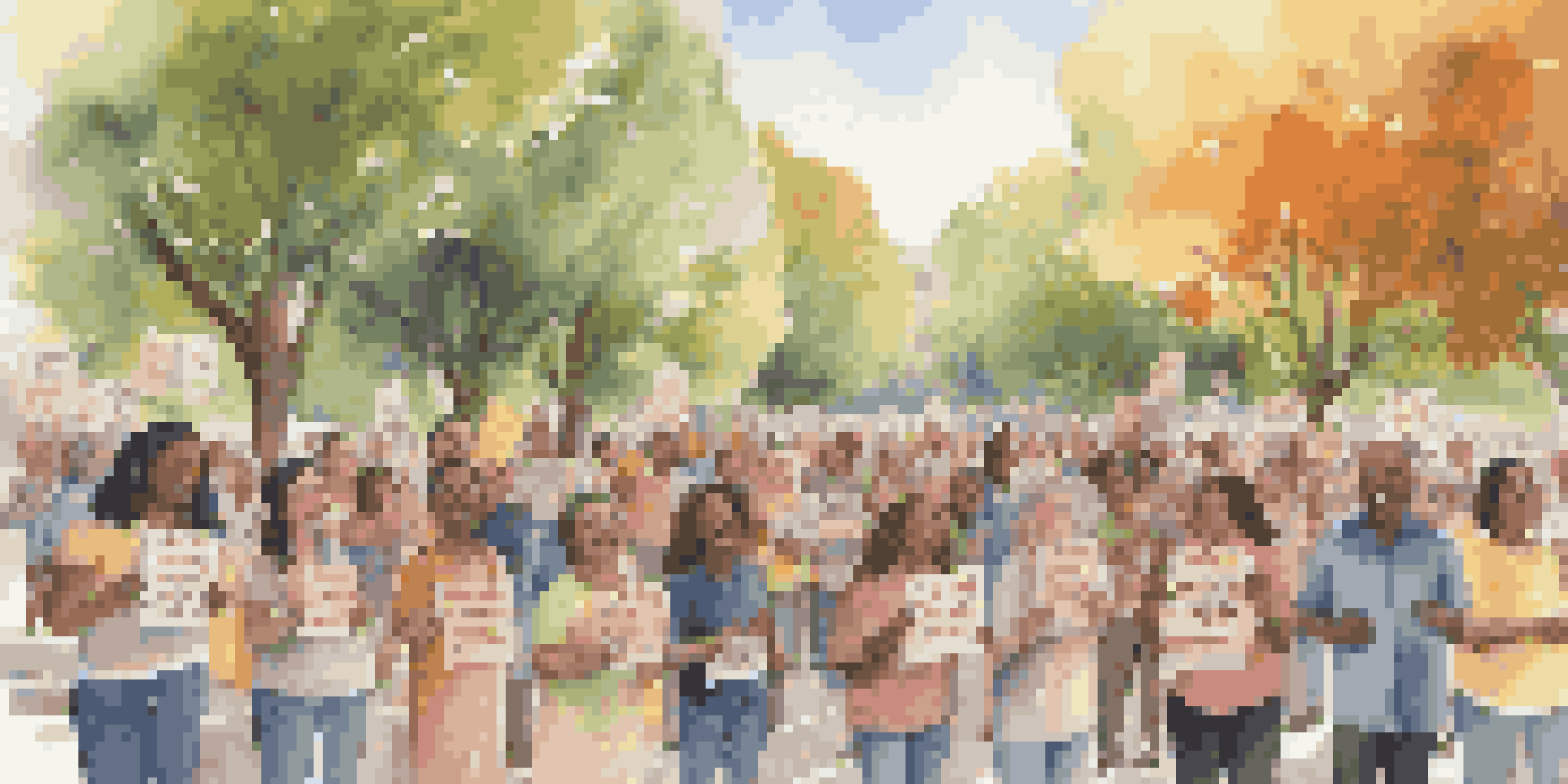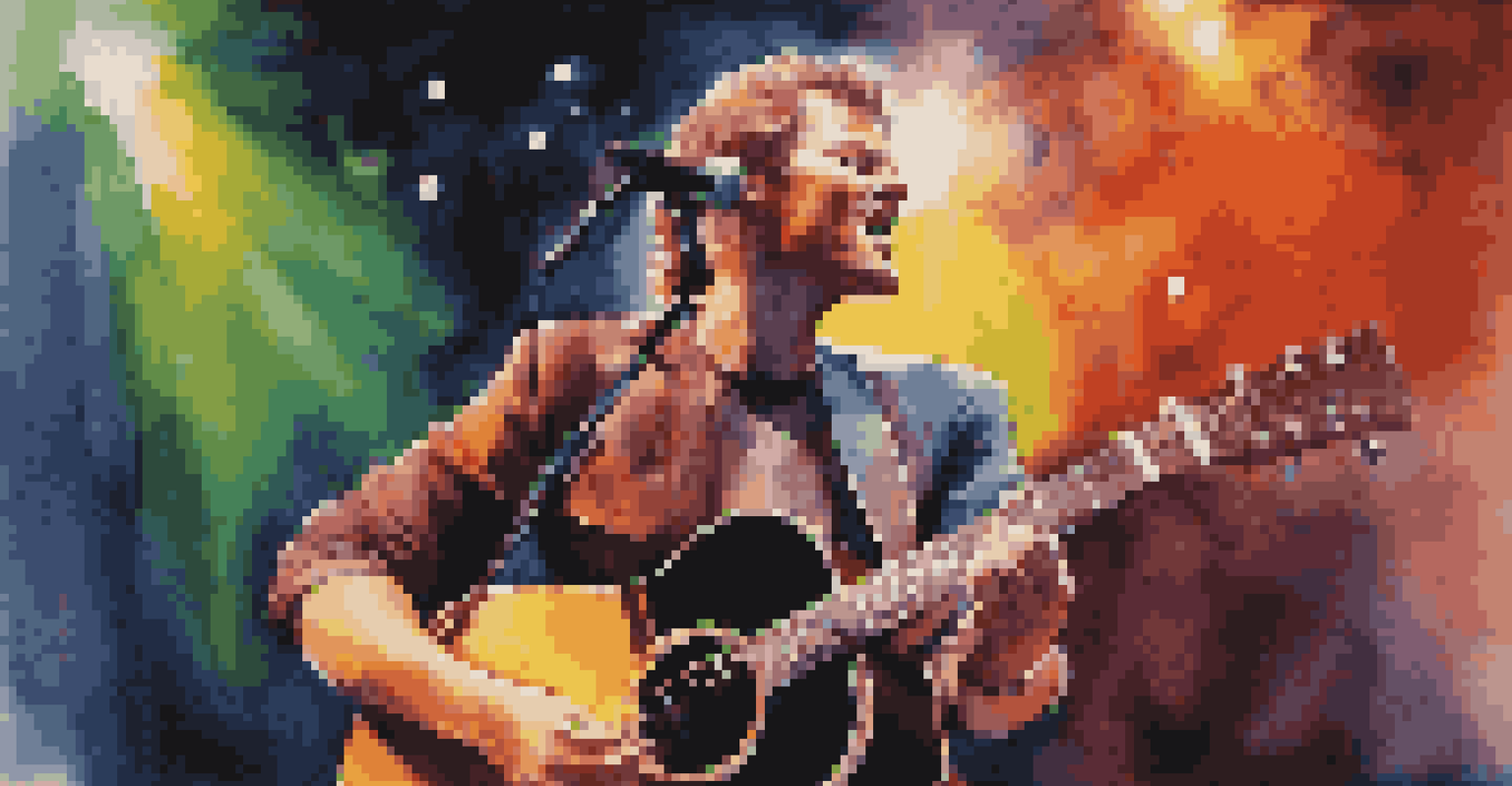The Sound of Change: Music's Role in Political Movements

Introduction: The Power of Music in Society
Music has always been a powerful form of expression, capable of conveying emotions and ideas that words alone sometimes cannot. From lullabies to anthems, the melodies we create often reflect the times we live in. In political movements, music serves as a rallying cry, uniting people under a common cause and inspiring action. It's fascinating to see how songs can transcend language and cultural barriers, creating a sense of solidarity among diverse groups.
Music can change the world because it can change people.
Consider the civil rights movement in the United States during the 1960s. Songs like 'We Shall Overcome' became anthems of hope and resistance, elevating the spirit of the struggle for equality. Similarly, modern movements like Black Lives Matter have incorporated music to amplify their messages and mobilize supporters. This demonstrates that the rhythm of change often beats to the sound of music.
As we delve deeper into the relationship between music and political change, we'll explore key historical moments where music played a pivotal role. From protest songs to viral anthems, the evolution of these musical expressions reflects the ongoing fight for justice and freedom.
The Role of Protest Songs in History
Protest songs have been a vital part of many social movements, providing a soundtrack to the struggle for justice. They often encapsulate the feelings of frustration and hope, making them powerful tools for mobilization. For instance, during the Vietnam War, songs like 'Fortunate Son' by Creedence Clearwater Revival captured the discontent of a generation opposed to the war. These songs not only influenced public opinion but also became symbols of resistance.

Moreover, protest songs often serve to document the struggles faced by marginalized groups, amplifying their voices in a society that may otherwise ignore them. In South Africa, during the apartheid era, songs like 'Nkosi Sikelel' iAfrica' became anthems of resistance, unifying people in their fight against oppression. The emotional weight of these songs resonates, making them unforgettable reminders of our shared history.
Music Unites for Social Change
Throughout history, music has served as a powerful tool for uniting people in social movements, offering a rallying cry for justice and solidarity.
As we look at the impact of these songs, it’s clear that they create a sense of community among listeners. When people sing together, they forge bonds that can strengthen their resolve and inspire them to continue the fight for change.
Iconic Artists Who Changed the Game
Throughout history, several artists have emerged as powerful voices for political change. Bob Dylan, for example, used his music to challenge societal norms and inspire a generation during the 1960s. His song 'The Times They Are A-Changin'' became an anthem for change, urging people to take action against injustice. This highlights how individual artists can influence the larger cultural landscape.
The power of music makes all the difference in the world. It can bring people together, inspire change, and unite communities.
Similarly, artists like Nina Simone and Joan Baez used their platforms to advocate for civil rights and social justice. Nina Simone's haunting rendition of 'Mississippi Goddam' directly addressed racial discrimination, making her a key figure in the civil rights movement. Their courage to speak out through their music has left an indelible mark on history, encouraging others to do the same.
These iconic artists remind us that music is not just entertainment; it can be a powerful catalyst for change. Their legacy continues to inspire new generations of musicians and activists, proving that the sound of change is timeless.
Music in Contemporary Movements
In today's digital age, the power of music in political movements has only grown stronger. Platforms like YouTube and Spotify allow artists to share their messages with a global audience almost instantly. Songs like 'This Is America' by Childish Gambino address pressing social issues, resonating with millions and sparking conversations around race and violence in America. The accessibility of music today enables it to serve as a potent tool for activism.
Moreover, social media has transformed how music is used in movements. Hashtags related to songs can quickly go viral, mobilizing support and raising awareness. For instance, the song 'Fight Song' by Rachel Platten became an anthem for numerous causes, from women's rights to mental health awareness, showcasing how music can inspire action beyond traditional political channels.
Protest Songs Shape Movements
Protest songs have played a crucial role in documenting struggles and inspiring communities, making them pivotal in the fight for equality and justice.
As these contemporary movements evolve, music remains at the forefront, providing both a soundtrack and a rallying call for those seeking change. The fusion of technology and music has created new avenues for activism, ensuring that the sound of change will continue to be heard.
Global Perspectives: Music Around the World
Music's role in political movements is not limited to any one country; it transcends borders and cultures. For instance, in Latin America, the Nueva Canción movement emerged in the 1960s, using folk music to address social injustices and political repression. Artists like Mercedes Sosa and Victor Jara became symbols of resistance, showing how music can reflect the struggles of a nation and inspire change.
In the Middle East, music has also played a crucial role in movements like the Arab Spring. Songs became symbols of hope and defiance, with artists like Ramy Essam capturing the spirit of the revolution in Egypt. His song 'Irhal' (Leave) became an anthem for those demanding change, illustrating how music can unite people in the face of adversity.
These global examples highlight the universal language of music and its power to resonate with diverse audiences. Regardless of where it originates, music has the ability to inspire and mobilize people across the world, reminding us that the fight for justice is a shared human experience.
The Impact of Digital Media on Music and Activism
Digital media has revolutionized the way music is created, distributed, and consumed, significantly impacting political activism. With just a smartphone, any artist can share their message, reaching audiences far and wide. This democratization of music means that grassroots movements can harness the power of songs to amplify their causes. For example, the viral success of 'Despacito' not only showcased cultural fusion but also highlighted how artists can leverage digital platforms to create social change.
Moreover, streaming services allow listeners to discover and engage with music that speaks to their values. Playlists dedicated to social issues can curate a collection of songs that inspire action and promote awareness. This accessibility fosters a sense of community among listeners, encouraging them to rally around shared goals and support one another in their efforts for change.
Digital Age Amplifies Music's Impact
The rise of digital media has transformed how music is shared and consumed, empowering artists and activists to reach global audiences and mobilize support for their causes.
As we continue to navigate an increasingly digital world, the intersection of music and activism will likely evolve. Embracing technology can empower artists and activists alike to create a more just and equitable society, reminding us that the sound of change is always within reach.
Conclusion: The Lasting Legacy of Music in Movements
As we reflect on the role of music in political movements, it's clear that its impact is profound and far-reaching. The melodies and lyrics that have accompanied struggles for justice serve as reminders of what has been achieved and what still needs to be done. Music not only chronicles our history but also inspires future generations to continue the fight for change.
The legacy of protest songs and political anthems is one that will endure, as new artists emerge to carry the torch. These songs will continue to evolve, adapting to the challenges of the time while retaining their core message of hope and resilience. Music has the unique ability to connect us, offering a sense of belonging and purpose in the face of adversity.

In conclusion, the sound of change is not merely a background score; it's a powerful force that shapes our world. As we navigate our own paths for justice and equality, let us remember the power of music to inspire, unite, and drive change.